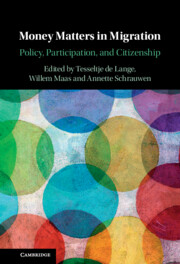Book contents
- Money Matters in Migration
- Money Matters in Migration
- Copyright page
- Contents
- Notes on Contributors
- 1 Money Matters in Migration: A Synthetic Approach
- Part I Migration
- Part II Participation
- 9 “This Is Affordable!” The Role of Money Matters in the Use of Live-In Migrant Care Arrangements
- 10 De-magnetizing the Market: European Integration, Employer Sanctions, and the Crackdown on Undeclared Work
- 11 Women as EU Citizens: Caught between Work, (Sufficient) Resources, and the Market
- 12 Migrant Financial Inclusion versus the Fight against Money Laundering and Terrorist Financing
- 13 Migrant Remittances and Money Laundering in Africa
- Part III Citizenship
- Index
- References
13 - Migrant Remittances and Money Laundering in Africa
from Part II - Participation
Published online by Cambridge University Press: 12 November 2021
- Money Matters in Migration
- Money Matters in Migration
- Copyright page
- Contents
- Notes on Contributors
- 1 Money Matters in Migration: A Synthetic Approach
- Part I Migration
- Part II Participation
- 9 “This Is Affordable!” The Role of Money Matters in the Use of Live-In Migrant Care Arrangements
- 10 De-magnetizing the Market: European Integration, Employer Sanctions, and the Crackdown on Undeclared Work
- 11 Women as EU Citizens: Caught between Work, (Sufficient) Resources, and the Market
- 12 Migrant Financial Inclusion versus the Fight against Money Laundering and Terrorist Financing
- 13 Migrant Remittances and Money Laundering in Africa
- Part III Citizenship
- Index
- References
Summary
This chapter investigates the intersection of the regulatory framework and practice of remittances of emigrants in Africa on the one hand and the regulatory frameworks of combating money laundering. The chapter contributes to the nascent scholarly literature on the peculiarities of interaction between the states parties of the African Union on the issues related to remittances and combating money laundering. The investigation reveals a complex relationship. At the core of this relationship lie a myriad of normative concepts relating to migrants and ‘money’: the fear of financing terrorism and human trafficking, the need for financial institutions to participate in the international financial configuration, the importance of remittances for the economies back home, and the struggle for migrants’ financial inclusion and reduced risk of falling victim to shady financial services, high costs, or even loss of their money. The chapter first discusses the global framework for remittances as designed by the World Bank and its relationship with the fight against money laundering and then presents three case studies: Somalia, South Africa, and Kenya.
- Type
- Chapter
- Information
- Money Matters in MigrationPolicy, Participation, and Citizenship, pp. 223 - 244Publisher: Cambridge University PressPrint publication year: 2021

